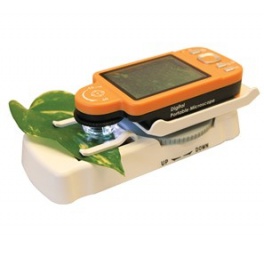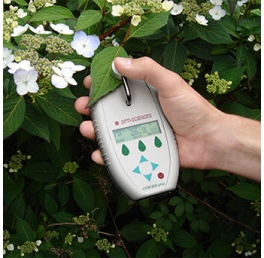Q-S151 Infrared CO2 Analyzer is a non-dispersive infrared CO2 analyzer that measures CO2 in 0 to 2000 ppm range with 1 ppm resolution. Dependable technology rugged and modular for easy fit in our Q-Box Packages or for stand alone use. Q-S151 is ideal for CO2 exchange measurements with leaves, insects, small animals or organisms with a low metabolic rate. It is also excellent for measuring soil respiratory activity in situ in the field and in the lab.
This CO2 analyzer may be used in a flow-through system configuration for instantaneous and continuous measurements of CO2 production or consumption. It can also be used in a closed system mode for measurements at extremely low activity levels.
This Q-S151 CO2 analyzer may be set up for use in the injection mode where small samples of CO2 gas are injected into a carrier gas flowing past the CO2 sensor for measurements of CO2 levels in the headspace of collected samples.
The Q-S151 is a key component of Qubit Systems’ carbon dioxide control system for regulating pCO2 in growth cabinet or rooms.
Features
- Switchable ranges of 0 – 500 ppm and 0 – 2000 ppm CO2
- 1 ppm CO2 resolution on digital display
- Non-dispersive infrared technology
- Modulated infrared light source = no moving parts
- 0 – 5 V analog output at both range settings
- Optional battery pack for field use
- Compact and portable
Applications
- Photosynthetic measurements
- Respiration of roots and soil samples
- Respirometry of insects and other invertebrates
- Head space analysis of cell cultures
- Atmospheric monitoring and control
| Operating principle | Non-dispersive infrared |
| Gas sampling mode | Flowing gas stream, sealed chamber |
| Maximum gas flow rate | 650 mL/min |
| Measurement range (LCD display) | 0 – 1999 ppm |
| Analog output, low sensitivity | 0 – 2000 ppm |
| Analog output, high sensitivity | 0 – 500 ppm |
| Accuracy | ± 1 ppm |
| Repeatability | (at stable atm press and temp)- Better than ±1 ppm |
| Maximum drift (per year) | ±100 ppm |
| Response time | (@ 250 mL/min; to 95% of final value) – ca. 25 sec |
| Warm up time (@ 22oC) | ca. 5 min |
| Output (linear) for Low Sensitivity setting | 0 – 5 VDC for 0 – 2000 ppm |
| Output (linear) for High Sensitivity setting | 0 – 5 VDC for 0 – 500 ppm |
| Calibration adjustments | Zero and Span |
| Operating temperature range | 0 to 50oC |
| Storage temperature range | -40 to 70oC |
| Operating pressure range | ±1.5% local mean pressure |
| Humidity range | 5 to 95% RH, non-condensing (recommend drying gas stream) |
| Pressure dependence | +0.19% reading per mm Hg |
| Power requirements | 12 VDC via 120 VAC/60 Hz adapter |
| Current requirements | 125 mA average, 450 mA peak |
| Dimensions (cm) | (H x W x D: 5.5 to 9.5 x 9.5 x 17) |
| Weight | 1kg |
| Warranty | 1 year limited |
- FL23 Algal CO2 Package
- Q-Box CO650 Plant CO2 Analysis Packages
- Q-Box RP1LP Low-Range Respiration Package
- Q-Box SR1LP Soil Respiration Package
- J. B. Ries, A. L. Cohen and D. C. McCorkle. A nonlinear calcification response to CO2-induced ocean acidification by the coral Oculina arbuscula. CORAL REEFS Vol 29, Number 3, p661-674 (2010).
- Simone E. Kolb, Kevin J. Fermanich and Mathew E. Dornbush. Effect of Charcoal Quantity on Microbial Biomass and Activity in Temperate Soils. SSSAJ: Vol 73, Number 4, p1173-1181. (2009).
- U. Rascher, E. G. Bobich, C. B. Osmond. The Kluge-Lüttge Kammer: A Preliminary Evaluation of an Enclosed, Crassulacean Acid Metabolism (CAM) Mesocosm that Allows Separation of Synchronized and Desynchronized Contributions of Plants to Whole System Gas Exchange. Plant biol (Stuttg) Vol. 8, number 1, p167-174 (2006).
- Jean E.T. McLain and Dean A. Martens. N2O production by heterotrophic N transformations in a semiarid soil. Applied Soil Ecology Vol 32, Issue 2 p253-263 (2006).
- Jean E.T. McLain and Dean A. Martens. Nitrous oxide flux from soil amino acid mineralization. Soil Biology and Biochemistry. Vol 37, Issue 2, p289-299 (2005).
- Mark O. Baerlocher, Douglas A. Campbell, and Robert J. Ireland. Developmental progression of photosystem II electron transport and CO2 uptake inSpartina alterniflora, a facultative halophyte, in a northern salt marsh. Can. J. Bot. Vol. 82, Number 3, p365–375 (2004)
- L.H. Ziska, J.A. Bunce and E.W. Goins. Characterization of an urban-rural CO 2/temperature gradient and associated changes in initial plant productivity during secondary succession. OECOLOGIA Volume 139, Number 3, p454-458 (2004).
- Y.P. Cen and D. B. Layzell. Does oxygen limit nitrogenase activity in soybean exposed to elevated CO2? Plant, Cell & Environment Vol 27, Issue 10, p1229–1238 (2004).
- Lewis H. Ziska, PhD, Dennis E. Gebhard, David A. Frenz, MD, Shaun Faulkner Benjamin D. Singerd and James G. Straka, PhD. Cities as harbingers of climate change: Common ragweed, urbanization, and public health. J ALLERGY CLIN IMMUNOL, Vol 111, Number 2, p290-294 (2003).
- Colette A. Sacksteder and David M. Kramer. Dark-interval relaxation kinetics (DIRK) of absorbance changes as a quantitative probe of steady-state electron transfer. PHOTOSYNTHESIS RESEARCH Vol 66, Numbers 1-2, p145-158 (2000).











